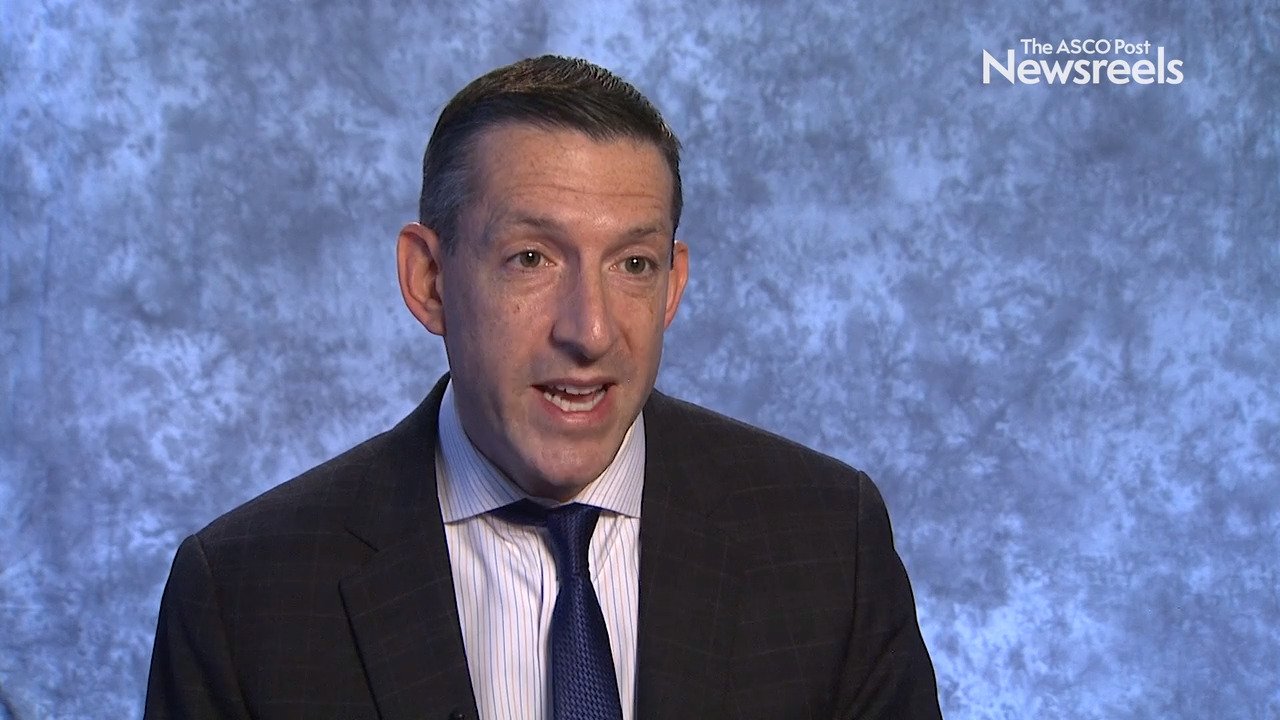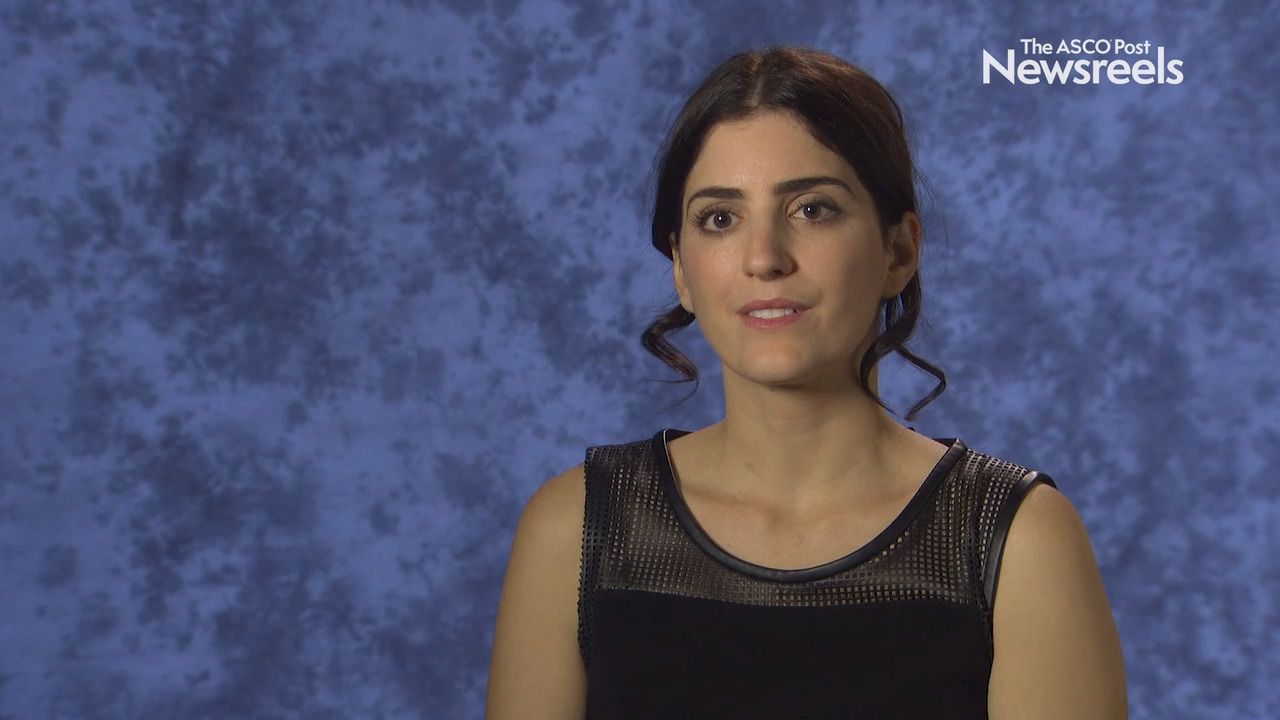Novel Treatments of Myelodysplastic Syndromes
AS PART of The ASCO Post’s continued coverage of the 2018 American Society of Hematology (ASH) Annual Meeting & Exposition, here is an update on seven different studies on new therapeutics in myelodysplastic syndromes (MDS). Among the treatments highlighted here are the erythroid maturation...
Combination Azacitidine and Lenalidomide as Salvage Therapy for Relapsed AML After Allogeneic Stem Cell Transplantation
In a phase I trial reported in the Journal of Clinical Oncology, Craddock et al found evidence that the sequential combination of azacitidine and lenalidomide may be an effective salvage therapy in patients with acute myeloid leukemia (AML) relapsing after allogeneic stem cell transplantation...
Study Finds Elevated Risk of MDS and AML After Chemotherapy for Most Solid Tumors
Findings from a new study by researchers at the National Cancer Institute (NCI) show that patients treated with chemotherapy for most solid tumors from 2000 to 2014 experienced an increased risk of therapy-related myelodysplastic syndrome/acute myeloid leukemia (MDS/AML). The study, which used U.S. ...
Mikkael A. Sekeres, MD, on MDS: Results From the Medalist Trial
Mikkael A. Sekeres, MD, of the Cleveland Clinic, discusses phase III study findings on luspatercept to treat anemia in patients with very low-, low-, or intermediate-risk myelodysplastic syndromes with ring sideroblasts who require red blood cell transfusions (Abstract 1).
Suleika Jaouad on Making the Most of a Life Interrupted: A Young Adult Perspective on Cancer
Suleika Jaouad, an Emmy Award–winning writer, advocate, and cancer survivor who was diagnosed at age 22 with myelodysplastic syndrome and acute myeloid leukemia, discusses what she has learned about coping with cancer, learning from it, and growing beyond it.
Selected Abstracts on Novel Therapies for Hematologic Malignancies
THE 22ND CONGRESS of the European Hematology Association (EHA) was held in June in Madrid, drawing hematologists and allied professionals from every subspecialty of hematology from around the world. Among the extensive educational and scientific program, the EHA Congress provides a forum for...
High-Risk Mutations Predict Poor Outcomes for Patients With Myelodysplastic Syndromes Undergoing Transplantation
Although several treatment options are available for patients with myelodysplastic syndromes (MDS), hematopoietic stem cell transplantation (HSCT) remains the only curative therapy.1 The risks of complications and death from transplantation can be substantial. Determining which patients may...
Mutations in Myelodysplastic Syndrome Associated With Poorer Outcome After Stem Cell Transplantation
In a study reported in The New England Journal of Medicine, R. Coleman Lindsley, MD, PhD, of Dana-Farber Cancer Institute, and colleagues found that a number of mutations present in patients with myelodysplastic syndromes (MDS) were associated with poorer clinical outcome after allogeneic...
FDA Allows Marketing of Test to Aid in the Detection of Certain Leukemias and Lymphomas
On June 29, the U.S. Food and Drug Administration (FDA) allowed marketing of ClearLLab Reagents (T1, T2, B1, B2, M), the first agency-authorized test for use with flow cytometry to aid in the detection of several leukemias and lymphomas, including chronic leukemia, acute leukemia, non-Hodgkin...
Reduced-Intensity vs Standard Conditioning Followed by ASCT in Myelodysplastic Syndrome
In the phase III RICMAC trial, use of a dose-reduced vs a standard myeloablative conditioning regimen prior to allogeneic stem cell transplantation (ASCT) did not appear to reduce 2-year relapse-free or overall survival in patients with myelodysplastic syndrome. These findings were reported by...
Expert Point of View: Steven D. Gore, MD, and Rami Komrokji, MD
Steven D. Gore, MD, Director of Hematologic Malignancies at Yale School of Medicine, New Haven, Connecticut, applauded Dr. Stein for “accruing a terrible patient population, mutation-wise” and called the preliminary findings for the benefit of enasidenib in patients with ASXL1 mutations...
Early Success Reported With Two New Agents for High-Risk Myelodysplastic Syndromes
At the 2016 American Society for Hematology (ASH) Annual Meeting & Exposition, researchers reported early success with two new experimental agents for high-risk myelodysplastic syndromes—enasidenib (also known as AG-221), a potent oral inhibitor of the isocitrate dehydrogenase 2 (IDH2) enzyme,...
Prognostic Scoring System for Patients Undergoing Allogeneic Hematopoietic Cell Transplantation for Myelodysplastic Syndrome
As reported in the Journal of Clinical Oncology, Shaffer et al have developed a prognostic scoring system for patients undergoing allogeneic hematopoietic cell transplantation for myelodysplastic syndrome. Study Details The study involved data from 2,133 patients with myelodysplastic syndrome in...
No Significant Survival Advantage for Rigosertib in High-Risk Myelodysplastic Syndromes, but Subgroups May Benefit
As reported in The Lancet Oncology by Garcia-Manero et al, the phase III ONTIME trial showed that treatment with the Ras mimetic rigosertib did not significantly improve overall survival vs best supportive care in patients with high-risk myelodysplastic syndromes after failure of hypomethylating...
Selected Abstracts From 2015 ASH Annual Meeting: Part 2
Here are several more abstracts selected from the proceedings of the 2015 American Society of Hematology (ASH) Annual Meeting and Exposition, highlighting therapeutics in acute leukemias and myelodysplastic syndromes. For five other top abstracts on therapies for acute leukemias and myelodysplastic ...
Alan F. List, MD, on Sotatercept in Lower-Risk Myelodysplastic Syndromes
Alan F. List, MD, of Moffitt Cancer Center, offers his thoughts on abstract 3251, “An Open-Label, Phase II, Dose-Finding Study of Sotatercept (ACE-011) in Patients With Low or Intermediate-1–Risk Myelodysplastic Syndromes or Nonproliferative Chronic Myelomonocytic Leukemia and Anemia Requiring Transfusion,” presented by Rami S. Komrokji, MD.
Richard M. Stone, MD, on the SWOG S1117 Study
Richard M. Stone, MD, of Dana-Farber Cancer Institute, offers his thoughts on abstract LBA-5, “A Randomized Phase II Study of Azacitidine Combined With Lenalidomide or With Vorinostat vs Azacitidine Monotherapy in Higher-Risk Myelodysplastic Syndromes and Chronic Myelomonocytic Leukemia: North American Intergroup Study SWOG S1117,” presented by Mikkael A. Sekeres, MD, MS.
Alan F. List, MD, on the CC-5013-MDS-005 Study
Alan F. List, MD, of Moffitt Cancer Center, offers his thoughts on abstract 409, “Efficacy and Safety of Lenalidomide vs Placebo in RBC Transfusion–Dependent Patients With IPSS Low-/Intermediate-Risk Myelodysplastic Syndromes Without Del(5q) and Unresponsive or Refractory to Erythropoiesis-Stimulating Agents: Results From a Randomized Phase III Study (CC-5013-MDS-005),” presented by Valeria Santini, MD.
Alan F. List, MD, on Rigosertib in Relapsed/Refractory Higher-Risk Myelodysplastic Syndrome
Alan F. List, MD, of Moffitt Cancer Center, offers his thoughts on abstract 163, “Overall Survival and Subgroup Analysis From a Randomized Phase III Study of Intravenous Rigosertib vs Best Supportive Care in Patients With Higher-Risk Myelodysplastic Syndrome After Failure of Hypomethylating Agents,” presented by Guillermo Garcia-Manero, MD. Time: 1:54
Alan F. List, MD, and James O. Armitage, MD, FACP, FRCP, on Advances in Myelodysplastic Syndrome
Alan F. List, MD, of Moffitt Cancer Center and the University of South Florida, and James O. Armitage, MD, FACP, FRCP, of the University of Nebraska Medical Center, discuss the biology and diagnostic criteria for myelodysplastic syndrome, as well as advances in the disease presented at the 56th ASH Annual Meeting.
James O. Armitage, MD, FACP, FRCP, and Richard M. Stone, MD, on Clinical Trial Results for AML, MDS, and CMML Treatment
James O. Armitage, MD, FACP, FRCP, of the University of Nebraska Medical Center, and Richard M. Stone, MD of the Dana-Farber Cancer Institute, discuss three clinical trials: different doses of daunorubicin for AML; comparing azacitidine plus lenolidomide to vorinostat vs azacitidine monotherapy in MDS and CMML; and sorafenib vs placebo in addition to standard treatment for AML.
Myeloablative Conditioning for Stem Cell Transplantation Remains Standard of Care in Patients With MDS and AML
A randomized trial from the Bone and Marrow Transplant Clinical Trials Network was halted early after concluding that allogeneic stem cell transplantation after a reduced-intensity conditioning regimen resulted in higher relapse rates compared to myeloablative conditioning. The phase III randomized ...
Ezatiostat Gets Orphan Designation for Treatment of Myelodysplastic Syndrome
Telik, Inc, announced that its product candidate, ezatiostat hydrochloride (Telintra), has been granted orphan drug designation by the FDA for the treatment of myelodysplastic syndromes (MDS). Ezatiostat is an investigational agent in development for the treatment of MDS and idiopathic chronic...
Forward Progress in Myelodysplastic Syndromes Is Largely in Genetics
Most recent advances in the management of myelodysplastic syndrome (MDS) are in the area of genetics, according to Steven Gore, MD, of Yale University School of Medicine, New Haven. “New genomics research is leading to a better understanding of MDS heterogeneity and disease biology, and may...
Early Data for AG-221 Show Unprecedented Activity in Acute Myeloid Leukemia and Myelodysplastic Syndrome
Although the data are preliminary, experts were impressed with responses to a novel IDH2 inhibitor called AG-221 in patients with hematologic malignancies. In the first clinical trial of AG-221, there were three complete remissions, two complete remissions with incomplete platelet count recovery...
Nationally Recognized Leader in Myeloid Malignancies, Alan F. List, MD, Has High Hopes for the Future of Oncology
The Tampa Bay area of Florida is a haven for golfers and fishermen looking to unwind under the warm tropical skies. And the clean highways stretching through the scenic west coast of Florida are also a perfect excuse for weekend motorcycle enthusiasts, such as Alan F. List, MD, the President and...
Advancing Classification and Risk Stratification for Leukemia and Myelodysplastic Syndromes
Refinements in the classification and risk stratification for leukemia and myelodysplastic syndromes were reported by three different investigators at the 2015 ASCO Annual Meeting. The first study showed that leukemia stem cell phenotypes are associated with outcomes in acute myeloid leukemia...
Selected Abstracts From 2015 ASH Annual Meeting
Here are several abstracts selected from the proceedings of this year’s American Society of Hematology (ASH) Annual Meeting and Exposition, highlighting therapeutics in acute leukemias and myelodysplastic syndromes. For full details of these study abstracts, visit...
Mikkael A. Sekeres, MD, on MDS and CMML Study Results: SWOG S1117
Mikkael A. Sekeres, MD, of the Cleveland Clinic, discusses an additional analysis of a phase II study of azacitidine combined with lenalidomide or with vorinostat vs azacitidine monotherapy in higher-risk myelodysplastic syndromes and chronic myelomonocytic leukemia (Abstract 908).
Self-Reported Fatigue Provides Independent Prognostic Information in Patients With Myelodysplastic Syndromes
In a prospective observational cohort study reported in The Lancet Oncology, Efficace et al found that a self-reported fatigue score provides independent prognostic information on overall survival in patients with higher-risk myelodysplastic syndromes. Fatigue assessment should be included in...
Study Explores Link Between Allele Expression and Risk of Graft-vs-Host Disease in Transplant Recipients
In a study reported in The New England Journal of Medicine, Petersdorf et al found a greater risk of acute graft-vs-host disease among hematopoietic cell transplant recipients with the high-expression rs9277534G allele linked to mismatched HLA-DPB1 who received transplants from donors with the...
ASH 2014: Combination Therapy Shown to Be Effective for Patients With Myelodysplastic Syndrome and AML
A phase II study investigating the potential of the drugs azacitidine and lenalidomide (Revlimid) demonstrated that the two therapies in combination may be an effective frontline treatment regimen for patients with higher-risk forms of myelodysplastic syndrome and acute myeloid leukemia (AML). The...
TP53, TET2, and DNMT3A Mutations Predict Poorer Survival After Hematopoietic Stem Cell Transplant in Patients With Myelodysplastic Syndrome
It is unclear whether somatic mutations that are strongly associated with phenotype and prognosis in myelodysplastic syndrome are also predictive of outcome after allogeneic hematopoietic stem cell transplantation. In a study reported in the Journal of Clinical Oncology, Bejar et al found that...
Past Exposure to Thiopurines Associated With Increased Risk of Myeloid Disorders in Patients With Inflammatory Bowel Disease
Past exposure to immunosuppressive drugs called thiopurines has been found to increase the risk of myeloid disorders, such as acute myeloid leukemia and myelodysplastic syndrome, among patients with inflammatory bowel disease (IBD). The findings were reported by Lopez et al in Clinical...
Prolonged Administration of Azacitidine Improves Response in Myelodysplasia, Less So in Combination With Entinostat
In the phase II US Leukemia Intergroup Trial E1905 reported in the Journal of Clinical Oncology, Prebet et al found that prolonged administration of lower-dose azacitidine produced a high response rate in patients with myelodysplastic syndrome or acute myeloid leukemia (AML) with myelodysplastic...
No Apparent Increased Risk of Myelodysplastic Syndrome With Definitive Radiotherapy in Prostate Cancer
Exposure to ionizing radiation has been associated with increased risk of myelodysplastic syndrome, and it remains unclear whether radiation doses used in prostate cancer treatment result in increased risk. In a retrospective cohort study reported in the Journal of the National Cancer Institute,...
Revised International Prognostic Scoring System for MDS Is Better at Predicting Survival than Older Systems
A retrospective analysis of 380 patients with myelodysplastic syndrome (MDS) registered in the Gruppo Romano Mielodisplasie Italian Regional database, which included data from 13 hematology centers in the Rome area, has found that the Revised International Prognostic Scoring System (IPSS-R) is...
Targeting Errant Immune System Enzyme Kills Myelodysplastic Cells
Scientists have successfully targeted a malfunctioning immune system enzyme to kill diseased cells from patients with myelodysplastic syndrome (MDS), a precursor to acute myeloid leukemia (AML). Reporting their results in Cancer Cell, researchers say their successful laboratory tests in human MDS...
Study Sets Guidelines for Stem Cell Transplants in Older Patients with Myelodysplastic Syndromes
A new study by an international team of scientists provides the first statistically based guidelines for determining whether a stem cell transplant is appropriate for older patients with myelodysplastic syndromes (MDS), the most common blood disorders in people over 60 years of age, and frequently...
Moffitt Cancer Center Researchers Study Use of Dasatinib for Patients with High-risk MDS
Researchers at Moffitt Cancer Center have completed a phase II clinical trial to determine the safety and efficacy of dasatinib (Sprycel) for patients with higher-risk myelodysplastic syndromes (MDS), chronic myelomonocytic leukemia, or acute myeloid leukemia resulting from MDS and have failed ...









